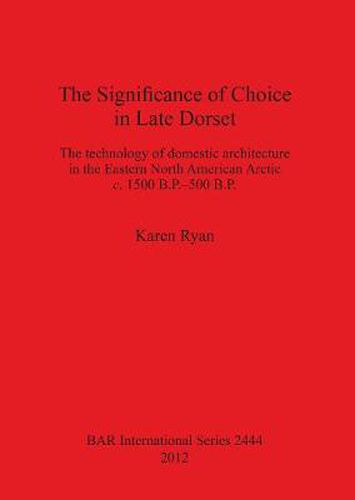Readings Newsletter
Become a Readings Member to make your shopping experience even easier.
Sign in or sign up for free!
You’re not far away from qualifying for FREE standard shipping within Australia
You’ve qualified for FREE standard shipping within Australia
The cart is loading…






This title is printed to order. This book may have been self-published. If so, we cannot guarantee the quality of the content. In the main most books will have gone through the editing process however some may not. We therefore suggest that you be aware of this before ordering this book. If in doubt check either the author or publisher’s details as we are unable to accept any returns unless they are faulty. Please contact us if you have any questions.
This study examines the domestic architecture produced by the Late Dorset, an Arctic-adapted hunter-gatherer society which occupied much of the Eastern North American Arctic between circa 1500 B.P. and 500 B.P. Throughout this research, architecture, like any artefact class, is considered a dynamic and socially constructed technology that is produced, maintained, and transmitted by its practitioners. It is replicated via sequences of learned actions or techniques; patterns thus result from adherence to cultural standards while differences represent instances of technological divergence. Such departures are typically ignored or suppressed in closed systems, although they can be tolerated or even widely adopted in more flexible ones. In order to identify and explore patterning in Late Dorset domestic architecture, this analysis adopts a methodological strategy centred on the chaine operatoire. Viewed through the lens of chaine operatoire, domestic architecture is treated as a conduit for informing on Late Dorset social structure and organisation. As part of this investigation, a multi-scalar research design was implemented. The first analytical scale examined architecture across the entire Eastern Arctic Palaeoeskimo period in order to recognise regional patterns of behavioural variability. The second stage of analysis focused on the micro-scale study of architectural remains from three locations, each presented as fully contextualised case studies.
$9.00 standard shipping within Australia
FREE standard shipping within Australia for orders over $100.00
Express & International shipping calculated at checkout
This title is printed to order. This book may have been self-published. If so, we cannot guarantee the quality of the content. In the main most books will have gone through the editing process however some may not. We therefore suggest that you be aware of this before ordering this book. If in doubt check either the author or publisher’s details as we are unable to accept any returns unless they are faulty. Please contact us if you have any questions.
This study examines the domestic architecture produced by the Late Dorset, an Arctic-adapted hunter-gatherer society which occupied much of the Eastern North American Arctic between circa 1500 B.P. and 500 B.P. Throughout this research, architecture, like any artefact class, is considered a dynamic and socially constructed technology that is produced, maintained, and transmitted by its practitioners. It is replicated via sequences of learned actions or techniques; patterns thus result from adherence to cultural standards while differences represent instances of technological divergence. Such departures are typically ignored or suppressed in closed systems, although they can be tolerated or even widely adopted in more flexible ones. In order to identify and explore patterning in Late Dorset domestic architecture, this analysis adopts a methodological strategy centred on the chaine operatoire. Viewed through the lens of chaine operatoire, domestic architecture is treated as a conduit for informing on Late Dorset social structure and organisation. As part of this investigation, a multi-scalar research design was implemented. The first analytical scale examined architecture across the entire Eastern Arctic Palaeoeskimo period in order to recognise regional patterns of behavioural variability. The second stage of analysis focused on the micro-scale study of architectural remains from three locations, each presented as fully contextualised case studies.